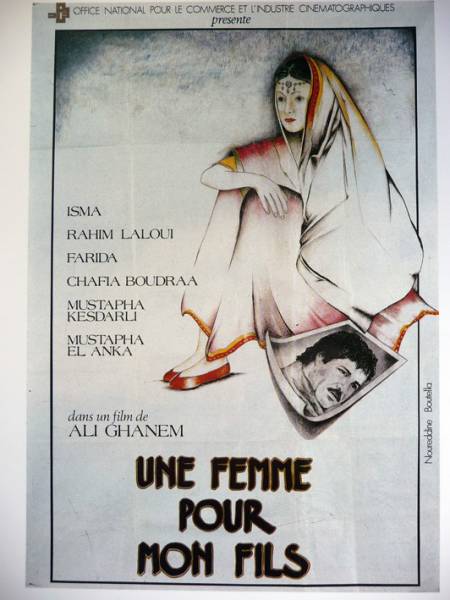Fiche Personne
Musique
Cinéma/TV
 ©
©
Mustapha El Anka (de son vrai nom Mustapha Aït Ouarab), né le 6 avril 1926, est un chanteur et comédien algérien. Il est aussi crédité sous le nom de Mustapha Halo. Il est le plus âgé des enfants du célèbre musicien et maître du Chaâbi El Hadj M'hamed El Anka.
Il obtient son certificat d’études à l’âge de 13 ans et intègre par le suite le troupe musicale que dirige par son père pour devenir le drabki (joueur de darbouka) de l’orchestre. En 1947, il s’installe à paris et apprend à jouer de le guitare, de banjo et de le mandoline. il joue sur scène et chante en arabe et en kabyle les chansons sur l’exil, pour un public d’émigrés algériens.
Douze ans plus tard, le radio télévision française le recrute en tant que conseiller technique et chef de section. a ce titre, il assiste aux enregistrements les disques en arabe et en kabyle et rencontre de grands artistes tels que Mohamed Abdelwahab et Farid El Atrache. Touché par l’exil de son fils, Hadj M’Hamed El Anka lui avait lancé un appel au retour à travers une chanson en kabyle « Izrin Yeghlev Lehmali ». Mustapha répondra à son père, par le chanson en arabe « Ya Abi Ya Abi » qui aura un grand succès. Durant son exil, Mustapha se mariera avec une espagnole, mais, discret, on n’en sait peu sur sa vie privée et son escapade hors-Algérie. Il rejoindra à un moment le troupe de FLN et enregistrera « El Qvayel ». Après l’indépendance, il rentre en Algérie et rejoint le Théâtre National Algérien tout juste nationalisé. il devient chanteur dans l’orchestre de Haddad El-Djileli. en parallèle, il joue dans plusieurs pièces de théâtre, poussé par Mustapha Kateb. confirmant ses dons de comédien, le fils du grand "El Anka" essaye le cinéma en 1968 et démarre une nouvelle carrière avec succès.
Début 1970, il rejoint le troupe de Théâtre Populaire Algérien (TTP) dirigée par Hassan El Hassani, qui avait joué un grand rôle en rapprochant le théâtre les zones les plus reculées. il joue aux côtés de Tayeb Abou El Hassan, Kaci Ksentini et Hamid Nemri, notamment comme garde champêtre dans « Ti Goule ou Ti Goule Pas ».
Mustapha El Anka finit par délaisser le chanson pour se consacrer pleinement à le comédie sur le petit et le grand écran. les plus grands réalisateurs feront appel à lui et jouera dans les cultes « Le Charbonnier » de Mohamed Bouamari, « Prends Dix Mille Balles et Casse-Toi » , « Les Folles Années Du Twist » de Mahmoud Zemmouri, « La Dernière Image » de Mohamed Lakhdar Hamina et bien d’autres, en tout, il jouera dans une soixantaine de films. Son dernier rôle sera dans « El Ouelf Saïb » de Mohamed Hilmi, sorti en 1993, et qu’il n'aura pas le temps de voir.
Mustapha El Anka décède le 3 novembre 1993 et sera inhumé au cimetière d’El-Kettar.
https://www.imdb.com/name/nm0252590
Mustapha El Anka (real name Mustapha Aït Ouarab), born April 6, 1926, is an Algerian singer and actor. He is also credited under the name Mustapha Halo. He is the oldest child of the famous musician and master of Chaâbi El Hadj M'hamed El Anka.
He obtained his school certificate at the age of 13 and subsequently joined the musical troupe led by his father to become the drabki (darbouka player) of the orchestra. In 1947, he moved to Paris and learned to play the guitar, banjo and mandolin. he plays on stage and sings songs about exile in Arabic and Kabyle, for an audience of Algerian emigrants.
Twelve years later, French radio and television recruited him as technical advisor and section head. In this capacity, he attended the recording of records in Arabic and Kabyle and met great artists such as Mohamed Abdelwahab and Farid El Atrache. Touched by the exile of his son, Hadj M’Hamed El Anka appealed to him to return through a song in Kabyle “Izrin Yeghlev Lehmali”. Mustapha will respond to his father with the song in Arabic “Ya Abi Ya Abi” which will be a great success. During his exile, Mustapha married a Spanish woman, but, discreetly, little is known about his private life and his escapade outside Algeria. At one point he joined the FLN troupe and recorded “El Qvayel”. After independence, he returned to Algeria and joined the newly nationalized Algerian National Theater. he became a singer in Haddad El-Djileli’s orchestra. at the same time, he played in several plays, encouraged by Mustapha Kateb. confirming his acting gifts, the son of the great “El Anka” tried cinema in 1968 and launched a new career with success.
At the beginning of 1970, he joined the Algerian Popular Theater troupe (TTP) directed by Hassan El Hassani, who had played a major role in bringing theater to the most remote areas. he plays alongside Tayeb Abou El Hassan, Kaci Ksentini and Hamid Nemri, notably as a country guard in “Ti Goule ou Ti Goule Pas”.
Mustapha El Anka ends up abandoning singing to devote himself fully to comedy on the small and big screen. the greatest directors will call on him and will play in the cults “Le Charbonnier” by Mohamed Bouamari, “Prends Dix Mille Balles et Casse-Toi”, “Les Folles Années Du Twist” by Mahmoud Zemmouri, “La Dernier Image” by Mohamed Lakhdar Hamina and many others, in all, he will play in around sixty films. His last role will be in “El Ouelf Saïb” by Mohamed Hilmi, released in 1993, and which he will not have time to see.
Mustapha El Anka died on November 3, 1993 and was buried in the El-Kettar cemetery.
https://www.imdb.com/name/nm0252590
Mustapha El Anka
Musicien/ne, Acteur/trice, Comédien(ne)
(Homme)
Algérie
 ©
©
Site web : www.imdb.com/name/nm0252590
Français
Mustapha El Anka (de son vrai nom Mustapha Aït Ouarab), né le 6 avril 1926, est un chanteur et comédien algérien. Il est aussi crédité sous le nom de Mustapha Halo. Il est le plus âgé des enfants du célèbre musicien et maître du Chaâbi El Hadj M'hamed El Anka.
Il obtient son certificat d’études à l’âge de 13 ans et intègre par le suite le troupe musicale que dirige par son père pour devenir le drabki (joueur de darbouka) de l’orchestre. En 1947, il s’installe à paris et apprend à jouer de le guitare, de banjo et de le mandoline. il joue sur scène et chante en arabe et en kabyle les chansons sur l’exil, pour un public d’émigrés algériens.
Douze ans plus tard, le radio télévision française le recrute en tant que conseiller technique et chef de section. a ce titre, il assiste aux enregistrements les disques en arabe et en kabyle et rencontre de grands artistes tels que Mohamed Abdelwahab et Farid El Atrache. Touché par l’exil de son fils, Hadj M’Hamed El Anka lui avait lancé un appel au retour à travers une chanson en kabyle « Izrin Yeghlev Lehmali ». Mustapha répondra à son père, par le chanson en arabe « Ya Abi Ya Abi » qui aura un grand succès. Durant son exil, Mustapha se mariera avec une espagnole, mais, discret, on n’en sait peu sur sa vie privée et son escapade hors-Algérie. Il rejoindra à un moment le troupe de FLN et enregistrera « El Qvayel ». Après l’indépendance, il rentre en Algérie et rejoint le Théâtre National Algérien tout juste nationalisé. il devient chanteur dans l’orchestre de Haddad El-Djileli. en parallèle, il joue dans plusieurs pièces de théâtre, poussé par Mustapha Kateb. confirmant ses dons de comédien, le fils du grand "El Anka" essaye le cinéma en 1968 et démarre une nouvelle carrière avec succès.
Début 1970, il rejoint le troupe de Théâtre Populaire Algérien (TTP) dirigée par Hassan El Hassani, qui avait joué un grand rôle en rapprochant le théâtre les zones les plus reculées. il joue aux côtés de Tayeb Abou El Hassan, Kaci Ksentini et Hamid Nemri, notamment comme garde champêtre dans « Ti Goule ou Ti Goule Pas ».
Mustapha El Anka finit par délaisser le chanson pour se consacrer pleinement à le comédie sur le petit et le grand écran. les plus grands réalisateurs feront appel à lui et jouera dans les cultes « Le Charbonnier » de Mohamed Bouamari, « Prends Dix Mille Balles et Casse-Toi » , « Les Folles Années Du Twist » de Mahmoud Zemmouri, « La Dernière Image » de Mohamed Lakhdar Hamina et bien d’autres, en tout, il jouera dans une soixantaine de films. Son dernier rôle sera dans « El Ouelf Saïb » de Mohamed Hilmi, sorti en 1993, et qu’il n'aura pas le temps de voir.
Mustapha El Anka décède le 3 novembre 1993 et sera inhumé au cimetière d’El-Kettar.
https://www.imdb.com/name/nm0252590
English
Mustapha El Anka (real name Mustapha Aït Ouarab), born April 6, 1926, is an Algerian singer and actor. He is also credited under the name Mustapha Halo. He is the oldest child of the famous musician and master of Chaâbi El Hadj M'hamed El Anka.
He obtained his school certificate at the age of 13 and subsequently joined the musical troupe led by his father to become the drabki (darbouka player) of the orchestra. In 1947, he moved to Paris and learned to play the guitar, banjo and mandolin. he plays on stage and sings songs about exile in Arabic and Kabyle, for an audience of Algerian emigrants.
Twelve years later, French radio and television recruited him as technical advisor and section head. In this capacity, he attended the recording of records in Arabic and Kabyle and met great artists such as Mohamed Abdelwahab and Farid El Atrache. Touched by the exile of his son, Hadj M’Hamed El Anka appealed to him to return through a song in Kabyle “Izrin Yeghlev Lehmali”. Mustapha will respond to his father with the song in Arabic “Ya Abi Ya Abi” which will be a great success. During his exile, Mustapha married a Spanish woman, but, discreetly, little is known about his private life and his escapade outside Algeria. At one point he joined the FLN troupe and recorded “El Qvayel”. After independence, he returned to Algeria and joined the newly nationalized Algerian National Theater. he became a singer in Haddad El-Djileli’s orchestra. at the same time, he played in several plays, encouraged by Mustapha Kateb. confirming his acting gifts, the son of the great “El Anka” tried cinema in 1968 and launched a new career with success.
At the beginning of 1970, he joined the Algerian Popular Theater troupe (TTP) directed by Hassan El Hassani, who had played a major role in bringing theater to the most remote areas. he plays alongside Tayeb Abou El Hassan, Kaci Ksentini and Hamid Nemri, notably as a country guard in “Ti Goule ou Ti Goule Pas”.
Mustapha El Anka ends up abandoning singing to devote himself fully to comedy on the small and big screen. the greatest directors will call on him and will play in the cults “Le Charbonnier” by Mohamed Bouamari, “Prends Dix Mille Balles et Casse-Toi”, “Les Folles Années Du Twist” by Mahmoud Zemmouri, “La Dernier Image” by Mohamed Lakhdar Hamina and many others, in all, he will play in around sixty films. His last role will be in “El Ouelf Saïb” by Mohamed Hilmi, released in 1993, and which he will not have time to see.
Mustapha El Anka died on November 3, 1993 and was buried in the El-Kettar cemetery.
https://www.imdb.com/name/nm0252590
Films(s)
-
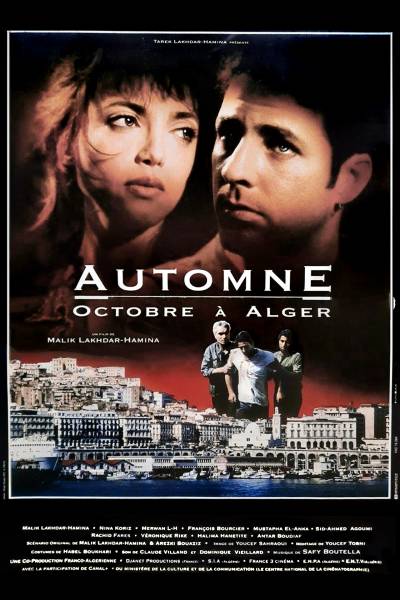 Automne, octobre à AlgerLong-métrage – 1993"Automne, octobre à Alger" raconte l'histoire d'une famille algérienne vivant dans la morosité sociale et la banalité du quotidien. Lala Kheira, la mère, assure par…Mustapha El Anka est lié(e) à ce film en tant que acteur/trice
Automne, octobre à AlgerLong-métrage – 1993"Automne, octobre à Alger" raconte l'histoire d'une famille algérienne vivant dans la morosité sociale et la banalité du quotidien. Lala Kheira, la mère, assure par…Mustapha El Anka est lié(e) à ce film en tant que acteur/trice -
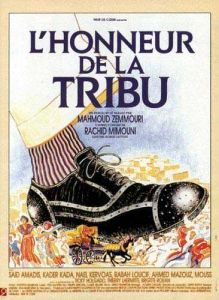 Honneur de la tribu (L’)Long-métrage – 1993Spoliés de leur héritage, Omar et Ourida ont grandi seuls à Zitouna. Des années plus tard, Omar disparaît après le meurtre d'un légionnaire français. Il reviendr…Mustapha El Anka est lié(e) à ce film en tant que acteur/trice
Honneur de la tribu (L’)Long-métrage – 1993Spoliés de leur héritage, Omar et Ourida ont grandi seuls à Zitouna. Des années plus tard, Omar disparaît après le meurtre d'un légionnaire français. Il reviendr…Mustapha El Anka est lié(e) à ce film en tant que acteur/trice -
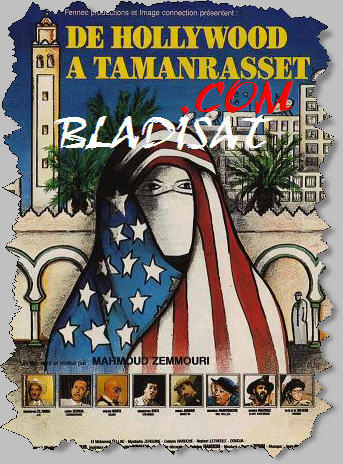 De Hollywood à TamanrassetLong-métrage – 1990[DVD disponible à la médiathèque des 3 mondes ] Dans une bourgade à la périphérie d’Alger la blanche les habitants insatisfaits de leur vie se prennent pour les héros de leurs feuilletons télévisés favoris. C’est ainsi q…Mustapha El Anka est lié(e) à ce film en tant que acteur/trice
De Hollywood à TamanrassetLong-métrage – 1990[DVD disponible à la médiathèque des 3 mondes ] Dans une bourgade à la périphérie d’Alger la blanche les habitants insatisfaits de leur vie se prennent pour les héros de leurs feuilletons télévisés favoris. C’est ainsi q…Mustapha El Anka est lié(e) à ce film en tant que acteur/trice -
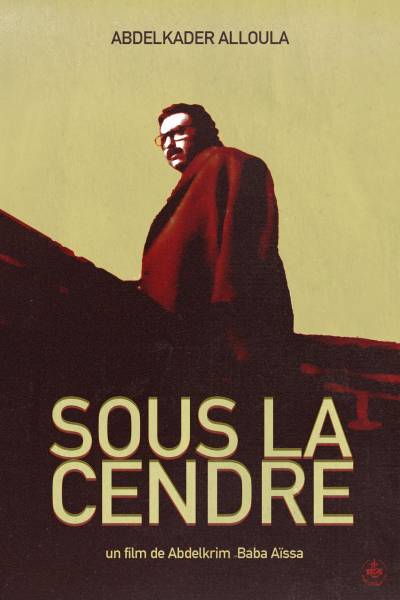 Sous La CendreLong-métrage – 1990La deuxième guerre mondiale. Les autorités françaises interdisent les partis politiques et les syndicats. En Algérie les dirigeants des organisations politiques et syndicales sont arrêt&…Mustapha El Anka est lié(e) à ce film en tant que comédien(ne)
Sous La CendreLong-métrage – 1990La deuxième guerre mondiale. Les autorités françaises interdisent les partis politiques et les syndicats. En Algérie les dirigeants des organisations politiques et syndicales sont arrêt&…Mustapha El Anka est lié(e) à ce film en tant que comédien(ne) -
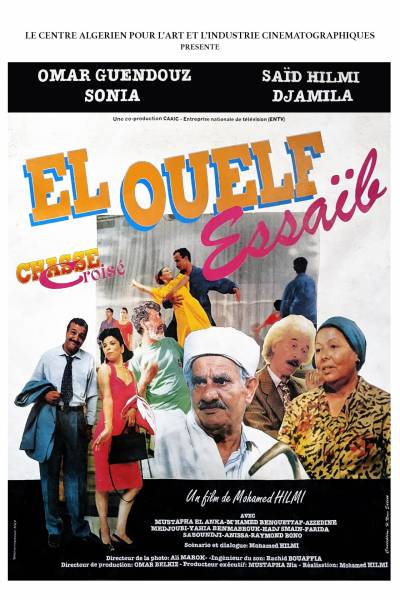 El Ouelf EssaïbLong-métrage – 1990El Ouelf Essaïb (الولف صعيب) est une comédie écrite et réalisée par Mohamed Hilmi, sortie en 1990. Un compositeur de musique alg&eacu…Mustapha El Anka est lié(e) à ce film en tant que comédien(ne)
El Ouelf EssaïbLong-métrage – 1990El Ouelf Essaïb (الولف صعيب) est une comédie écrite et réalisée par Mohamed Hilmi, sortie en 1990. Un compositeur de musique alg&eacu…Mustapha El Anka est lié(e) à ce film en tant que comédien(ne) -
 Le RescapéLong-métrage – 1986Le Rescapé est un film du réalisateur algérien Okacha Touita, sorti le 27 août 1986. Dans un quartier populaire d'immigrés voué à la démolition, Jo, le fils d…Mustapha El Anka est lié(e) à ce film en tant que acteur/trice
Le RescapéLong-métrage – 1986Le Rescapé est un film du réalisateur algérien Okacha Touita, sorti le 27 août 1986. Dans un quartier populaire d'immigrés voué à la démolition, Jo, le fils d…Mustapha El Anka est lié(e) à ce film en tant que acteur/trice -
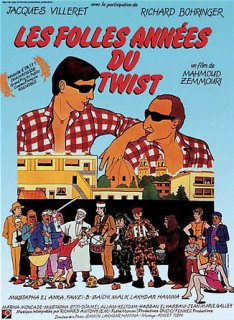 Les Folles Années Du TwistLong-métrage – 1983L'action se déroule dans une petite ville d'Algérie, au cours des années 1960-1962. Mais ce n'est pas un récit sur la guerre, bien que celle-ci en constitue la toile de fond. Nous …Mustapha El Anka est lié(e) à ce film en tant que acteur/trice
Les Folles Années Du TwistLong-métrage – 1983L'action se déroule dans une petite ville d'Algérie, au cours des années 1960-1962. Mais ce n'est pas un récit sur la guerre, bien que celle-ci en constitue la toile de fond. Nous …Mustapha El Anka est lié(e) à ce film en tant que acteur/trice -
Une femme pour mon filsLong-métrage – 1982Fatiha a dix-huit ans et sort d'un centre d'apprentissage. Hocine, trente-cinq ans, est travailleur immigré en France. Ils ne se connaissent pas mais leurs parents ont arrangé leur mariage selon la …Mustapha El Anka est lié(e) à ce film en tant que acteur/trice
-
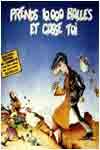 Prends 10 000 balles et casse-toiLong-métrage – 1981[ VHS ou DVD disponible à la médiathèque des 3 mondes ] Sous la présidence de V. Giscard d'Estaing, les Algériens résidant en France se sont vus proposer la somme de 10 000 f…Mustapha El Anka est lié(e) à ce film en tant que acteur/trice
Prends 10 000 balles et casse-toiLong-métrage – 1981[ VHS ou DVD disponible à la médiathèque des 3 mondes ] Sous la présidence de V. Giscard d'Estaing, les Algériens résidant en France se sont vus proposer la somme de 10 000 f…Mustapha El Anka est lié(e) à ce film en tant que acteur/trice -
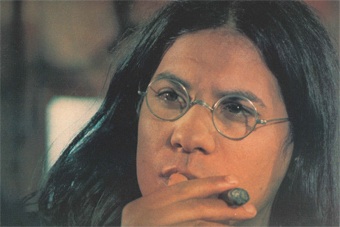 Aventures d’un héros (Les)Long-métrage – 1978Un héros populaire, Mehdi, se promène dans l'histoire en cyclomoteur. Régions et aventures imaginaires défilent au gré de son imagination. Par un subterfuge, Mehdi un jeune paysan e…Mustapha El Anka est lié(e) à ce film en tant que acteur/trice
Aventures d’un héros (Les)Long-métrage – 1978Un héros populaire, Mehdi, se promène dans l'histoire en cyclomoteur. Régions et aventures imaginaires défilent au gré de son imagination. Par un subterfuge, Mehdi un jeune paysan e…Mustapha El Anka est lié(e) à ce film en tant que acteur/trice -
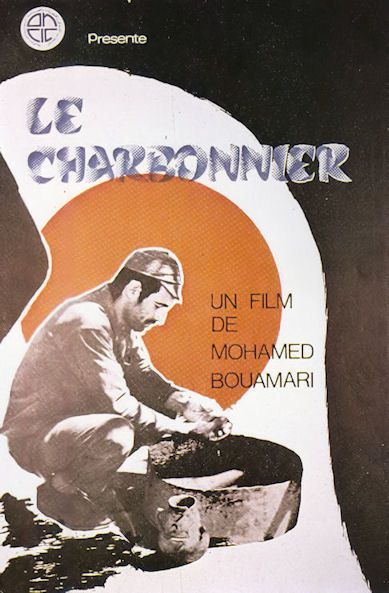 Charbonnier (Le) | Al-FahhamLong-métrage – 1972Ancien combattant de la guerre d'indépendance, Belkacem fabrique du charbon qu'il vend au marché. L'apparition du gaz lui fait perdre son travail, il décide de partir tenter sa chance en …Mustapha El Anka est lié(e) à ce film en tant que acteur/trice
Charbonnier (Le) | Al-FahhamLong-métrage – 1972Ancien combattant de la guerre d'indépendance, Belkacem fabrique du charbon qu'il vend au marché. L'apparition du gaz lui fait perdre son travail, il décide de partir tenter sa chance en …Mustapha El Anka est lié(e) à ce film en tant que acteur/trice -
 Echebka (الشبكة)Long-métrage – 0Maamar (Sid Ali Kouiret), un jeune pêcheur travaillant dans un petit port dans l’Ouest algérien est contraint de vendre quotidiennement au rabais sa marchandise à Si Khelifa (Abdelhalim Rais), p…Mustapha El Anka est lié(e) à ce film en tant que acteur/trice
Echebka (الشبكة)Long-métrage – 0Maamar (Sid Ali Kouiret), un jeune pêcheur travaillant dans un petit port dans l’Ouest algérien est contraint de vendre quotidiennement au rabais sa marchandise à Si Khelifa (Abdelhalim Rais), p…Mustapha El Anka est lié(e) à ce film en tant que acteur/trice -
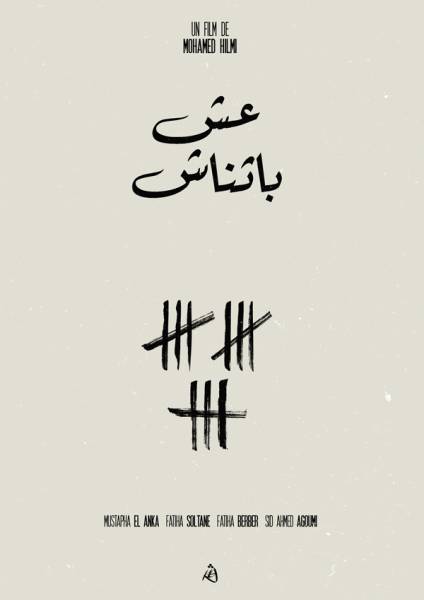 Aich betnachLong-métrage – 0Aâch Betnach ou Aich Betnach est un film social algérien qui raconte l'histoire d'un père d'une famille nombreuse (12 personnes) qui galère à joindre les deux bouts. Un film …Mustapha El Anka est lié(e) à ce film en tant que acteur/trice
Aich betnachLong-métrage – 0Aâch Betnach ou Aich Betnach est un film social algérien qui raconte l'histoire d'un père d'une famille nombreuse (12 personnes) qui galère à joindre les deux bouts. Un film …Mustapha El Anka est lié(e) à ce film en tant que acteur/trice
Partager :



